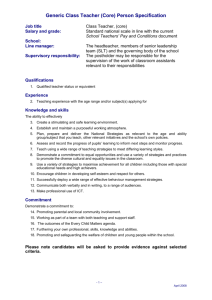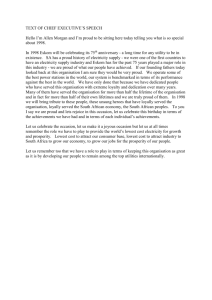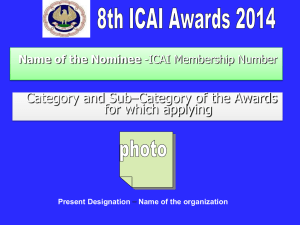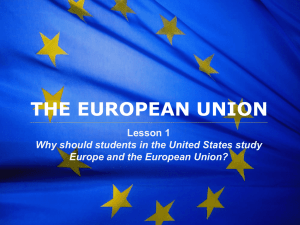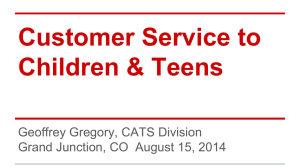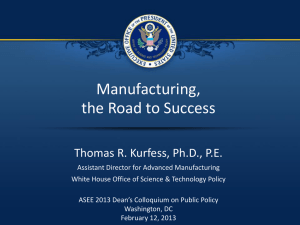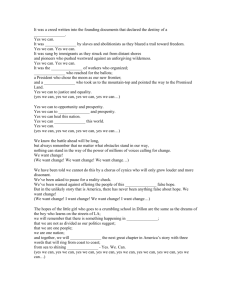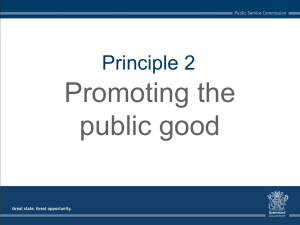DOC - Europa
advertisement
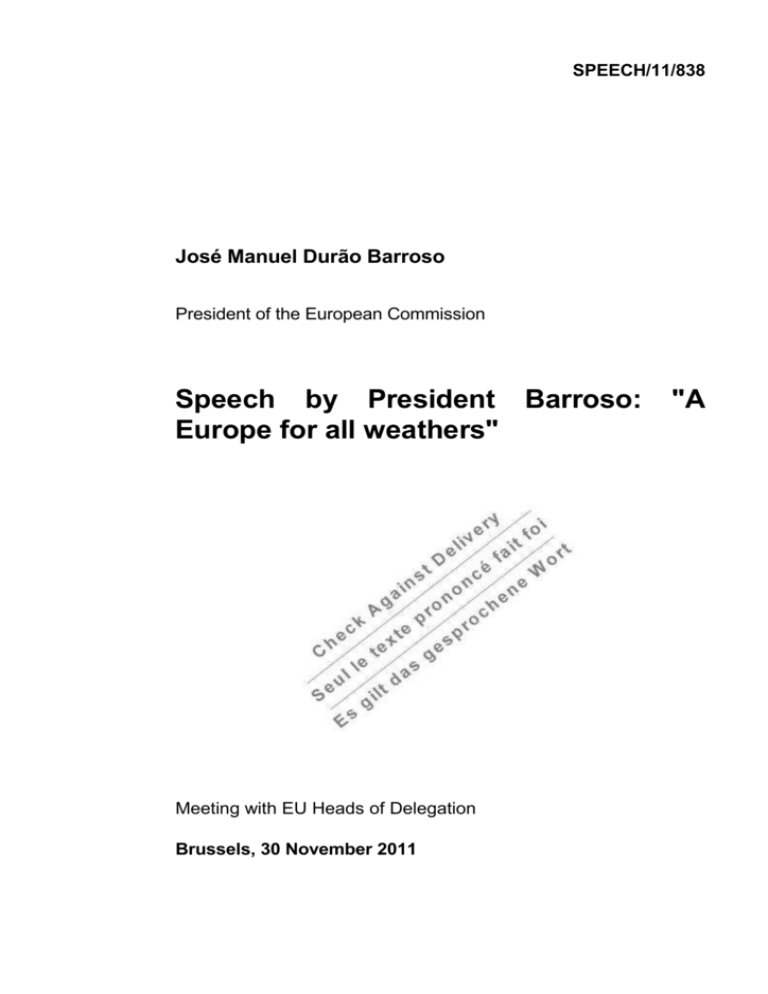
SPEECH/11/838 José Manuel Durão Barroso President of the European Commission Speech by President Barroso: Europe for all weathers" Meeting with EU Heads of Delegation Brussels, 30 November 2011 "A Ladies and gentlemen, Dear Ambassadors, It is a pleasure to address you all once again after a year full of events. A diplomat's life is – in the best case scenario – just the right mix between strategic prediction and exciting surprise. Well, I guess most of us have had their fair share of surprises in recent times that few of us would have dared to predict. Who would have said, some time ago, that the debt crisis would have led us to take the determined measures that are now being decided? Who would have predicted that the winds of freedom would blow from Tunis to Yemen and Syria? Who would have predicted that the European Union would be opening a delegation in Tripoli, in a free Libya? There are moments in time when history accelerates, when we reach crossroads, when uncertainties are high, when we have to embrace change, overcome the status quo and take critical decisions that will reshape our environment. We are at such a moment. The world is changing. History is accelerating. And Europe stands right in the middle of these sweeping transformations. Europe has to change if it is not to be left behind. We have to actively shape our world together – if not, we will be driven by events. European renewal That is why I have recently called for a "European renewal" in the State of the Union speech I delivered in the European Parliament. More than once in the history of European integration, the visionary wisdom of Jean Monnet has proved to be a source of inspiration. He wrote in his Memoirs that "Europe will be forged in crises, and will be the sum of the solutions adopted for those crises." This still holds true today. Although the truth is also that today we are probably facing the most serious crisis in the history of European integration. Overcoming this crisis is our first priority. This is essential for our economies, for our citizens, for our social model but also for our foreign policy. As you know well the attractiveness of our model, the strength of our currency, and the size of our internal market are Europe's best assets when facing today's world. We need therefore to build a strong and sustainable recovery on sound foundations. We need to complete the monetary union with a true economic union. The increasingly systemic nature of the crisis has also made it clear that we must pursue with greater integration of economic governance, especially within the Euro area. The Commission has been at the forefront of developing a collective and global European response to the crisis. And things are moving. Probably not at the pace that markets wanted, but democracies will always be slower than markets. Our message for our partners, your message in the countries you are accredited must be crystal-clear. We are not complacent. Europe is fully assuming its responsibilities. We have already taken bold measures and more bold action is still to come. 2 Foreign Policy starts at home In the "G20 World" we live in, foreign relations start at home and domestic policies are at the centre of global meetings. I have lost count of how many Summits with third partners I have attended, I have participated in all G20 meetings since its creation, I am now the dean of the G8, and I can assure you that there is not one such meeting where these issues, which also lie at the heart of the Commission's work, are not discussed. Our challenge is to allow the European Union to maintain its place and its political and economic influence in a world where geopolitical, geo-economic and geostrategic realities are undergoing profound changes. Our challenge is to show that Europe can withstand all kinds of weather. Global action as the paradigm For 60 years we have in the EU been a laboratory for successful cross-border supranational cooperation. And yes, we have been highly successful in building our European house and working on the international stage. We have built just the kind of cooperation we all need in today's world and which we need to preserve and nurture. However these days the bookshelves of European bookstores start to be filled with volumes arguing that Europe is in decline in face of the rising of the emerging economies. While we should not be naïve and should recognise that there is heavy competition in today's world and that the European way is not the only way, I would also warn against a view of world politics which sees a zero-sum game between rising and declining powers. The gain of one does not need to be someone else's pain. In fact if there is a silver lining to this global crisis, it is perhaps that it has shown how interdependent we all are. Therefore, we need to work ever more closely together. Our strategy must be a combination of engagement with others and the pursuit of the European interest. And this is true well beyond the current crisis and the economic and financial fields. Most of the challenges we face are global in nature and call for global responses - from the fight against climate change and our work for energy security to the fight against poverty and hunger, from Africa and Afghanistan to the Middle East and South America. We will not shy away from our European responsibilities and we will not shy away from our global responsibilities. We must think strategically about our relations with our partners, encompassing all aspects of policy. This is needed more than ever in current circumstances. It is what I expect from you all. Remain open and play on our strengths Ladies and Gentlemen, Europe has always been open to the world and to other cultures and civilizations. We will remain open, not least at this difficult moment. 3 We have everything to gain from this, both in promoting and defending our economic and trade interests and in promoting and defending our values. This open approach is part and parcel of our recovery strategy. In a world where economists predict that 90% of future growth will take place outside of Europe it would be self-defeating if we turned inwards. We must therefore have a clear strategic vision on how to capitalize on our strengths. Let's not forget that Europe is a community based on strong political values: democracy, freedom, rule of law, respect for human dignity. They are a source of inspiration for so many people around the world. We can be proud of such achievements. We have to defend and promote them. Let's not forget that Europe is the largest economy, the leading trading power in the world, the top destination for foreign direct investment, the second reference currency in the world and the world's biggest donor of development aid. We can be proud of such achievements. And we clearly have an interest in a multilateral global order with a fair and rulesbased international framework, from economic governance to human rights, from trade to climate. We must therefore pursue our efforts to support those who are fighting for freedom and prosperity, starting with our neighbours. While their future depends on their own choices we clearly need to help them on the path towards economic and political reforms. Europe is often accused of a "lack of speed". I find this criticism unfair. After all, we were the first to react with a comprehensive strategy to the changes taking place in the North Africa: the "Partnership for Democracy and Shared Prosperity". And we should not underestimate either the role that our modern and open societies have had in inspiring these young men and women to rebel against tyranny and dictatorship. I have this year travelled to Tunis and Cairo to bring this message of support, straight to Tahrir Square. Europe's attractiveness has not faded for the Western Balkans countries either, whom we are committed to bring into the European family, provided they make the necessary reforms. Croatia is a good case in point. Next week we will sign the Accession Treaty. I have visited this year all the candidates and potential candidate countries in the region to reaffirm this commitment. The European Union also remains engaged in promoting political association and economic integration with our Eastern partners. This was the message that I brought to the Eastern Partnership Summit recently held in Warsaw. Europe is also on demand elsewhere in the world. From Latin America, where we have concluded trade agreements with the Andean countries and are negotiating with Mercosur; Africa where we are fighting poverty and promoting development and regional integration; to Asia where Europe’s benign power can do much to support stability, open trade and promote a rules based regional order. I have travelled to the Pacific this year to recall that Europe is a Pacific partner and it is my intention to visit South East Asia next year. So on the international front our message is also very clear. Europe is not turning in on its own institutional problems. We are not taking a break from world affairs. We are acutely aware of our global interdependence and our European responsibilities in the world. And we are assuming them. 4 Challenges ahead Next year will be key for the multilateral system which is so important for the EU. Without prejudging the outcome of the WTO ministerial in Geneva and of the Conference of the Parties in Durban, it is clear that we will have to develop innovative ideas and approaches to give a new dynamic to these two negotiations. Trade and climate change issues will not disappear and we need to find global solutions to address them. There will be elections in the US and Russia and leadership changes in China which will have an impact on these countries and on our relations. 2012 will also be the litmus test for our ability to successfully support the Arab Spring. In this respect, I would like to underline the need to mobilise all our energy and our commitment to promote a successful transition in Libya, Tunisia and Egypt, and the rest of the region. We also need to move forward with our strategic partners notably the US, China, Japan, Brazil, Russia and India, and to deepen further these relations which are essential for EU's prosperity and security. As an example, just two days ago, we have decided with the President of the United States to launch a high level working group to foster the transatlantic relationship and identify policies to increase bilateral trade and investment and to support jobs and growth. We will also launch an urbanization partnership with China to assist in jointly managing the multiple challenge of urbanization and we will continue implementing the modernization partnership with Russia which beyond purely economic modernisation also promotes the rule of law. These are three concrete examples of EU initiatives which will bring a real impact in our relations with the partner countries and their peoples. All this will require hard work to help prepare and shape the EU's position and make sure we reach our objectives. But it is worth it and you can count on my commitment to make the best of your advice. Finally, in the light of 2011, we need to be prepared collectively to face and manage potential crisis or hotspots. Some of them are already in the cards such as the deterioration of the situation in Syria and in Iran, but others are not, and external policy will continue to surprise us. We must all be ready for that. The institutional front The good news is that now we have an External Action Service. Its first year has been active, demanding and challenging. But I am happy to say that the EEAS has passed the stress test. Whether in our delegations around the world or in the Brussels headquarters, thanks to you and your colleagues, Europe is making a difference in world politics today. Everyday, you speak with our partners, you negotiate with them, you engage in conversations with the world. Everyday, you offer a helping hand, you build, you assist. Everyday you spot advantages for Europe. I am myself a witness to your excellent work, whenever I travel abroad or receive foreign visitors. And here my message to you is very clear: thank you for your work, support and dedication. 5 Your role is key in contributing to shape our own European destiny and not let others dictate it for us. In a fast changing world, we will have to work even harder to maintain our reputation as a source of fair solutions. We will need to be more vigorous in promoting our interests. We will need to strengthen our defence policy and develop the capacity to project power. We will need to ensure that Europe is a by-word for innovation and excellence throughout the world. As Niall Ferguson – the British historian – stated in his last book, “the greatest challenge we face does not come from abroad but rather from our own loss of faith in the project we inherited from our ancestors.” So, let us face these new challenges with pride in our European achievements and a commitment to our European future. I count on you – Europe's true Ambassadors – to remain engaged, to remain proud to be European, proud to belong to this project and determined in making a difference. I thank you for your attention. 6
